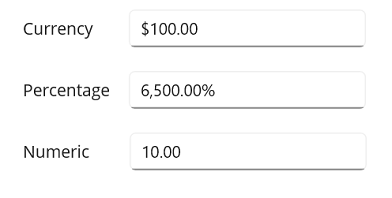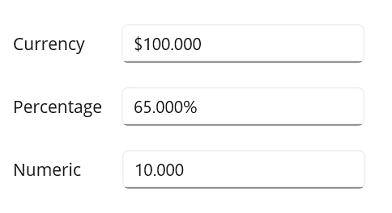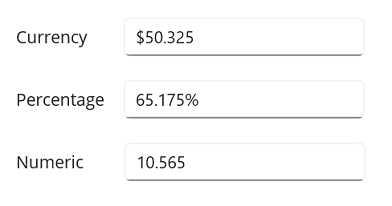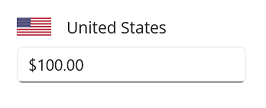How can I help you?
Value Formatting with .NET MAUI NumericEntry
17 Jan 20258 minutes to read
This section explains how to change the value format of the NumericEntry control using the CustomFormat properties.
Currency, percentage and decimal format
The value of the NumericEntry control can be formatted using the CustomFormat property. By default, the value is formatted based on the current culture’s decimal format. The default value of the CustomFormat properties is null.
The following example shows how to set the CurrencyFormatter, DecimalFormatter, and PercentFormatter for the NumberFormatter property.
Using the N, C, and P format values, we can apply numeric, currency, and percent custom formats in the CustomFormat property.
NOTE
You can apply various custom formats available in this page, which are supported for the
doubletype.
// Format stock price in currency.
<editors:SfNumericEntry CustomFormat="C2" WidthRequest="200" />
// Format product discount in percent.
<editors:SfNumericEntry CustomFormat="P2" WidthRequest="200" />
// Format worked hours in decimal.
<editors:SfNumericEntry CustomFormat="N2" WidthRequest="200" />// Format stock price in currency.
var stockPrice = new SfNumericEntry
{
CustomFormat = "C2",
WidthRequest = 200
};
// Format product discount in percent.
var productDiscount = new SfNumericEntry
{
CustomFormat = "P2",
WidthRequest = 200
};
// Format worked hours in decimal.
var hoursWorked = new SfNumericEntry
{
CustomFormat = "N2",
WidthRequest = 200
};
Format the integer digits
You can change the decimal digits of the value in the NumericEntry control using the CustomFormat properties.
For the CustomFormat property, use the 0 format specifier to set the minimum number of decimal digits.
NOTE
0 (Zero placeholder) replaces the zero with the corresponding digit present in the value; otherwise, zero appends with the leftmost position of the value.
// Format stock price in currency.
<editors:SfNumericEntry CustomFormat="$00000.00" WidthRequest="200"/>
// Format product discount in percentage.
<editors:SfNumericEntry CustomFormat="00000.00%" WidthRequest="200"/>
// Format worked hours in decimal.
<editors:SfNumericEntry CustomFormat="00000.00" WidthRequest="200"/>// Format stock price in currency.
var stockPrice = new SfNumericEntry
{
CustomFormat = "$00000.00",
WidthRequest = 200
};
// Format product discount in percentage.
var productDiscount = new SfNumericEntry
{
CustomFormat = "00000.00%",
WidthRequest = 200
};
// Format worked hours in decimal.
var hoursWorked = new SfNumericEntry
{
CustomFormat = "00000.00",
WidthRequest = 200
};
Format the fractional digits
You can change the fractional digits of the value in the NumericEntry control using the CustomFormat Properties.
For the CustomFormat property, use the 0 format specifier to set the minimum number of fractional digits.
NOTE
0 (Zero placeholder) replaces the zero with the corresponding digit in the value.
<editors:SfNumericEntry CustomFormat="$000.000" WidthRequest="200"/>
<editors:SfNumericEntry CustomFormat="00.000%" WidthRequest="200"/>
<editors:SfNumericEntry CustomFormat="00.000" WidthRequest="200"/>var stockPrice = new SfNumericEntry
{
CustomFormat = "$000.000",
WidthRequest = 200
};
var productDiscount = new SfNumericEntry
{
CustomFormat = "00.000%",
WidthRequest = 200
};
var hoursWorked = new SfNumericEntry
{
CustomFormat = "00.000",
WidthRequest = 200
};
Apply custom format
You can apply custom formats to the NumericEntry control using the 0 and # format specifiers. Using these format specifiers, you can set the minimum and the maximum number of fractional digits in the CustomFormat property.
-
0 (Zero placeholder) replaces the zero with the corresponding digit present in the value; otherwise, zero appends with the leftmost position of the value.
-
# (Digit placeholder) replaces the number sign symbol with the corresponding digit present in the value; otherwise, no digit will append to the value.
In the following example, the value of the CustomFormat property is #.00##, hence it will allow a maximum of 4 fractional digits and a minimum of 2 fractional digits.
<editors:SfNumericEntry x:Name="stockPrice" CustomFormat="$00.00##" WidthRequest="200"/>
<editors:SfNumericEntry x:Name="productDiscount" CustomFormat="00.00##%" WidthRequest="200"/>
<editors:SfNumericEntry x:Name="hoursWorked" CustomFormat="00.00##" WidthRequest="200"/>var stockPrice = new SfNumericEntry
{
CustomFormat = "$00.00##",
WidthRequest = 200
};
var productDiscount = new SfNumericEntry
{
CustomFormat = "00.00##%",
WidthRequest = 200
};
var hoursWorked = new SfNumericEntry
{
CustomFormat = "00.00##",
WidthRequest = 200
};
Culture support
The culture support allows the control to be configured for a specific language. To configure this, use the culture property.
CultureInfo culture = new CultureInfo("en-US");
NumericEntry.Culture = culture;
Customize percentage display
When the SfNumericEntry is in percentage format, the value can be displayed in two ways as follows:
Value: Displays the actual value with percentage symbol.
<editors:SfNumericEntry x:Name="numericEntry" WidthRequest="200"
CustomFormat="p"
Value="1000"
PercentDisplayMode="Value">
</editors:SfNumericEntry>SfNumericEntry sfNumericEntry= new SfNumericEntry();
sfNumericEntry.CustomFormat = "p";
sfNumericEntry.Value = 1000;
sfNumericEntry.PercentDisplayMode = PercentDisplayMode.Value;
sfNumericEntry.WidthRequest = 200;
Compute: Displays the computed value with percentage symbol.
<editors:SfNumericEntry x:Name="numericEntry" WidthRequest="200"
CustomFormat="p"
Value="1000"
PercentDisplayMode="Value">
</editors:SfNumericEntry>SfNumericEntry sfNumericEntry= new SfNumericEntry();
sfNumericEntry.Value = 1000;
sfNumericEntry.CustomFormat = "p";
sfNumericEntry.PercentDisplayMode = PercentDisplayMode.Value;
sfNumericEntry.WidthRequest = 200;
NOTE
Default value of PercentDisplayMode is
Compute.
Manage maximum decimal digits
The maximum number of digits to be displayed after the decimal point can be specified by using the MaximumNumberDecimalDigits property.
NOTE
The
MaximumNumberDecimalDigitsproperty can only be set to a positive value and does not work when a CustomFormat is provided. The default value of MaximumNumberDecimalDigits is 2.
<editors:SfNumericEntry x:Name="numericEntry" WidthRequest="200"
Value="1000.23232"
MaximumNumberDecimalDigits="3">
</editors:SfNumericEntry>SfNumericEntry sfNumericEntry= new SfNumericEntry();
sfNumericEntry.WidthRequest = 200;
sfNumericEntry.Value = 1000.23232;
sfNumericEntry.MaximumNumberDecimalDigits = 3;